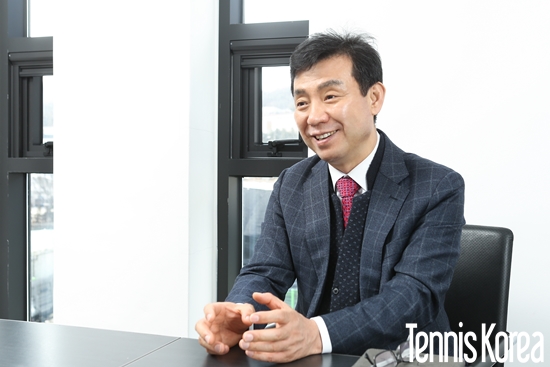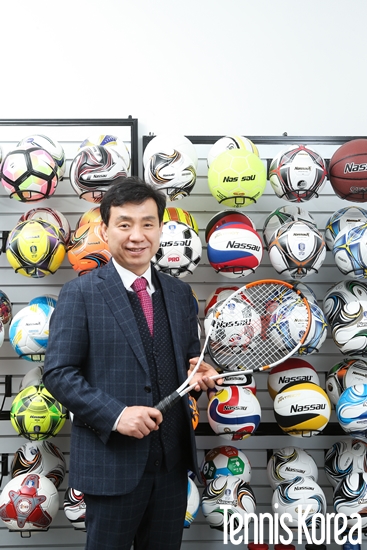NEWS
| Title | Eun Hyung Ju, CEO of Nassau: "We Will Protect the Pride of Korean Sports Brands" |
| Content |
April 3, 2019, 11:08 By Park Jun-yong (loveis5517@tennis.co.kr), Photos by Choi Dae-il (Studio UP)
"Phew… There’s still a long way to go," said Ju, CEO of Nassau, nearly two years after acquiring the company. Although the acquisition marked a major step, the process of normalization and revitalization remains an ongoing challenge. Acquiring a struggling company on the verge of collapse is no small feat?it takes more than just business acumen. But driven by a strong sense of duty to preserve a Korean brand, Ju decided to acquire Nassau, a domestic sports equipment company that was facing disbandment. We sat down with him to learn more about his journey, the obstacles ahead, and his long-term vision. Ju is an experienced economist. He began his career at LG Economic Research Institute, later moving through Ssangyong Economic Research Institute, Ssangyong Securities, and serving as CFO for a venture firm. In 2006, he acquired a private memorial park, Haneulmun, through an auction and entered the memorial services business. When asked why he acquired Nassau?seemingly unrelated to his previous ventures?Ju explained, "I had always been interested in manufacturing and was looking for a consumer-focused business that could also serve as a second career path for retiring Haneulmun employees. When Nassau became available for acquisition, it aligned with those goals." Founded in 1971, Nassau was named after the Dutch royal title meaning "the best." In 1973, the company began R&D on tennis balls and was officially certified by both the United States Tennis Association (USTA) and the Korea Tennis Association (KTA) in 1976. Nassau accelerated felt production that same year, developing both woven and needle felt. It was later selected as the official ball supplier for the tennis events at the 1986 Asian Games and the 1988 Seoul Olympics. From 1988 to 1990, Nassau balls were used as the official balls for the Australian Open, one of the four Grand Slam tournaments. Despite its advanced technology, Nassau eventually faced severe financial difficulties and was on the brink of liquidation. "A friend told me that Nassau was up for sale due to prolonged financial troubles. The company was just three days away from forced closure. It was heartbreaking to see a Korean sports brand disappear, so I decided to acquire it," Ju recalled. "Considering Korea is the 11th-largest economy in the world, it was frustrating to see that local brands had so little presence in the market. In 2016, domestic brands held less than 10% market share in Korea’s 68 trillion won sports industry. Even if I couldn’t profit, I felt Nassau had to survive as a symbol of national pride." The situation at the time of acquisition was far from ideal. "The handover process was rough, and the early stage of recovery was very difficult," Ju admitted. "The manufacturing ecosystem is vastly different from service industries. Managing raw material sourcing, inventory, marketing, and promotions was a steep learning curve. This isn’t something you can do with passion alone. I have a newfound respect for everyone working in Korea’s manufacturing industry." When asked about Nassau’s strategy for competing with global sports brands, Ju modestly brushed off the idea of "competition" and instead likened it to a battle between David and Goliath, stressing differentiation and technological strength. Nassau, which has served as an official sponsor of the Korea Football Association for over 25 years, developed the world’s first four-panel soccer ball, the Tuji FA, now the official match ball for the Korean FA Cup. Recently, Nassau also developed a tennis ball that doesn’t freeze in winter. "We use high-quality rubber sourced from our Indonesian factory. By adjusting the rubber blend ratio that forms the ball’s core, we created a product that maintains consistent bounce even in cold temperatures," Ju explained. To stay competitive in soccer ball R&D, Nassau collaborates with Professor Hong Seong-chan of Tsukuba University in Japan, an expert in ball engineering, to ensure their technology and trends remain up to date. Nassau’s strategy for survival goes beyond traditional markets. In December of the previous year, the company signed a sponsorship agreement with Korean eSports team OGN Entus to supply apparel and gear. Nassau has also entered into a licensing agreement with Marvel, and in October launched a children’s sportswear line through a collaboration with kidswear brand Dellanuri under the Nassau x Dellanuri label.
Ju commented, "Despite competing well against global brands, younger generations are unfamiliar with Nassau. For people in their 50s and 60s, it’s a nostalgic brand. But will it stay that way? Or can it become a beloved brand for young consumers and a symbol of Korean pride? That’s why we began targeting popular platforms like eSports." Nassau is also expanding through large sports expos, where it explores new buyers, analyzes industry trends, and seeks cost-effective ways to reach consumers. The company is developing additional sales routes based on this data. Through the establishment of its Sports Science Research Center, Ju is combining sports with IT and biotechnology. "Our business is now divided into equipment, apparel, and healthcare. The research center supports innovation in both product development and health tech. Our goal is to become a leading brand in sports equipment by integrating biotech," Ju said. Despite these efforts, Ju expressed frustration that Korean consumers often overlook Nassau in favor of foreign brands. "When a product is certified by an international body, it means it meets the standards for competitive use. Nassau tennis balls are certified by both the ITF and KTA and are of the same quality as imported brands. We’ve been making tennis balls for 47 years. Our workers are so experienced, they could probably make them in their sleep," he said with pride. He added, "The sports equipment market has reached maturity. Sales no longer correlate directly with quality. It’s about price competitiveness and consumer preference. Our Indonesian factory allows for semi-automated production of small batches, so we’re always looking for new clients. We currently export about $1.5 million worth of products annually." In recognition of these efforts, Nassau won the Grand Prize in the Sports Business/Brand category at the 4th Sports Marketing Awards in 2018. Launched in 2014, the event honors excellence and growth in the sports industry. Ju shared, "Rather than pride, I felt deep gratitude. I was moved to tears by the shared desire to protect Korea’s brand identity. It strengthened my resolve to meet expectations." For Ju, the most important value in business is that a company should "be true to its purpose." "A business should not create anything harmful. The first and most important customers are the employees. If employees aren’t satisfied with the products they make, they shouldn’t be sold. Employee development is essential, and when satisfaction is high internally, it naturally leads to value creation for customers," he said, sharing his management philosophy. Ju also practices noblesse oblige. Despite Nassau’s financial challenges, he signed a sponsorship agreement with TAFISA last year. The organization runs sport-for-all programs in Africa, and Nassau plans to donate soccer balls, basketballs, and volleyballs in February. "I’ve always dreamed of sports-based missionary work. I want to use Nassau’s export expertise to send balls with messages of hope and faith to children in impoverished regions. If Nassau stabilizes, we’ll continue this work freely. It’s another reason I acquired the company," he revealed. Ju concluded, "The era of appealing to patriotism alone is over. Nassau wants to be a good company?one that represents Korea with dignity. We aim to win over consumers not through emotion, but through technology, quality, and value. "Sports for all" Ultimately, we hope Nassau plays a vital role in building a healthy, vibrant society where everyone can enjoy sports and find hope." |

